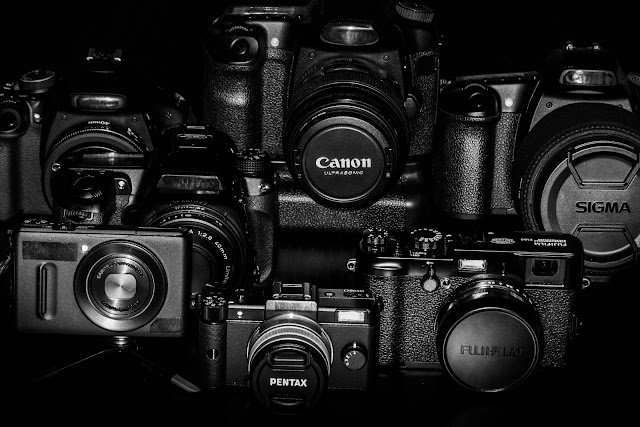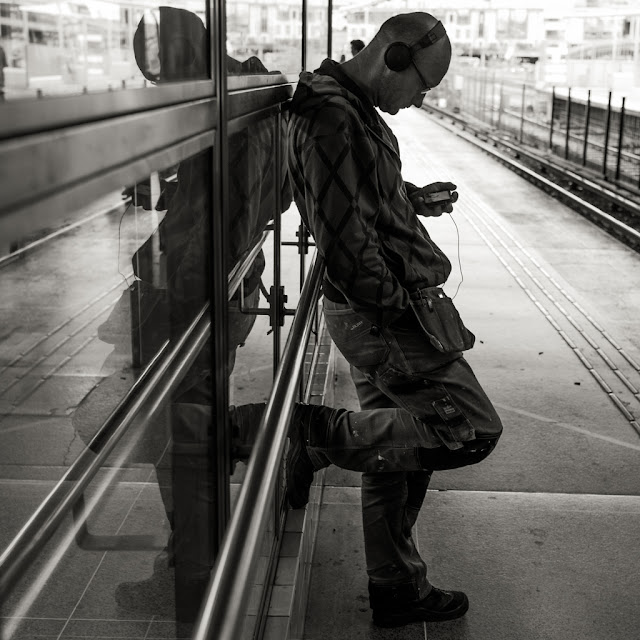When it comes to camera gear or any digital items
there is often allot of feelings involved. Many people grow a personal relation
to their “things” and put them or even the company that makes the product on a
pedestal. There is a word for this kind of obsessiveness; a “fanboy” or
“fangirl”. I find it remarkable how people get devoted for a brand to that
extent that even if a better technology is developed and used by a competitor,
the user still fight for his/her brand as it was a matter of life and death.
Even though I like most of my cameras and some other technical stuff I use in
my daily life, I don’t have to defend why brand “a” is better than “b”, in the
sense that it matters to me personally. Cameras are just tools to be used for
capturing the images we see with our eyes; a tool no matter what the brand name written on the camera, it is built to create an image onto an analogue film or a digital sensor. I am
currently using cameras from three different camera makers, Canon, Pentax and
Fujifilm, and I enjoy each of the cameras for their unique style of
performance. There is always coming out new and better cameras, all the time,
but the thing is your old camera doesn’t get worse just because a new and
better one is being released. It is still the same great camera as yesterday.
My Canon 40D broke down a while ago, it got the
famous shutter button disease, where the shutter is not firing when the button
is pressed or there is a huge delay. I got too many missed shots, so I decided
to upgrade to a similar camera. Because I am heavily invested into the Canon
lens system I wanted a Canon body to replace the 40D. I looked around on the
web to check out what was similar in performance regarding colour depth,
dynamic range and ISO performance, and I found that the 600D was about the same
as the 40D in this respect. It also had a low price and a rotatable screen and
a movie mode, which my 40D was lacking, so I got some new features with my new
buy. Sure I missed out of some specs too, like the aperture wheel, the penta
prism and a slower burst mode, but these were things I was willing to work
around, because I wasn’t impressed what I saw in the higher line of the Canon
cameras so I decided to settle down with the 600D for now.
I also got into the Pentax DSLR system
recently. I picked up the K-5 just before it was put off the shelves and I got
it for a very nice price. I got into the Pentax system because it offered very
much value for the money, with specs that Canon users only can dream of. Some
of these specs were the weather sealing and 100% viewfinder, and the compact
sturdy build quality. If you then add some small Limited lenses to the system
you have a very competent and compact system that is the same in size as a
Canon Rebel (xxxD series) but performs like a Canon 5D MkII (or even MkIII in
some regards).
This is how I use my seven cameras in my
current lineup:
Canon 30D: this one is almost retired but I
still use it sometimes and usually together with my Sigma 150/2.8 macro.
Canon 40D: this camera I exclusively use with
portrait lenses like the 85/1.8 or 70-200/4. I have the battery grip mounted
permanently on the 40D, since the main shutter button is dead, so I only use it
in portrait mode.
Canon 600D: my new Canon all-around camera that
I use mostly together with my longer tele lenses but also together with my
latest Canon lens (the 40mm/2.8 SDM).
Pentax K-5: this is my choice when I want to
bring a compact DSLR to catch high dynamic range scenes or just want to bring a
small and competent DSLR in my messenger bag.
Pentax Q: my fun time camera, when I just
want to grab something and go out shooting for fun, or when I want a small
camera that delivers good enough b/w images of my children playing etc.
Canon PS S100: well it creates for most parts good
enough images for a camera that I always can bring with me wherever I go, but
of course there are better alternatives out there today (like the Sony RX 100).
Fujifilm X100: for my street photography but I
also use it for some landscape shooting and other stuff, my most used camera in
my bag.
My most used cameras at the moment.
My most used cameras at the moment.
Back row from the left: Canon 600D+40/2.8 STM, Canon 40D+85/1.8, Canon 30D+Sigma 150/2.8 macro.
Middle row: Pentax K-5+40/2.8 Limited.
Front row: Canon PS S100, Pentax Q+01 standard prime, Fujifilm X100 (Black limited ed)
Front row: Canon PS S100, Pentax Q+01 standard prime, Fujifilm X100 (Black limited ed)














